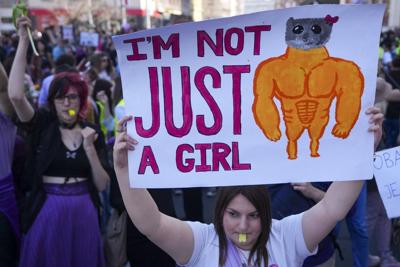WeŌĆÖve seen the data. WeŌĆÖve heard the stories. Many young men are struggling to find their place in the world. Maybe they canŌĆÖt find a job or a partner; maybe they feel isolated, with no real outlet for their emotions. In the United States, , and men are more likely to bottle up their feelings than express them.
These young men have become the enthusiastic target demographic for charlatans such as Joe Rogan, Andrew Tate, Jordan Peterson and the rest of the so-called manosphere, a loose collection of online communities and influencers peddling ┬ĀŌĆ£the idea that emotional control, material wealth, physical appearance and dominance, especially over women, are markers of male worth,ŌĆØ . And this is no niche phenomenon: two-thirds of young men ŌĆ£regularly engage with masculinity influencers online.ŌĆØ
A common refrain in the manosphere is the allegation that society is rigged against men and in favour of women. ŌĆ£As a man, I feel left behind,ŌĆØ one 19-year-old told the Star in May, adding that when he reads the news, ŌĆ£itŌĆÖs all about minorities, itŌĆÖs all about women.ŌĆØ And the federal election in April showed a widening ideological gap between the sexes: although many Canadians, especially women, found Conservative Leader Pierre PoilievreŌĆÖs anti-feminist message unappealing, it resonated strongly with young men.
Amid this backdrop, nearly half of Canadian men now believe not only that theyŌĆÖre asked to do too much in the name of gender equality, but also thattheyŌĆÖre the ones being discriminated against. Many young men blame feminism for the challenges they face. They believe that policies aimed at fixing gender inequality have tipped the scales in womenŌĆÖs favour, that progressives donŌĆÖt care about them.
Of course, we do care about young menŌĆÖs feelings of denial and defensiveness, of alienation and loneliness and discontent: gender justice is not a zero-sum game, and progressivism doesnŌĆÖt discount the very real challenges men face. And while these feelings donŌĆÖt invalidate the experiences of women, they tell us something important about: weŌĆÖre losing young men to right-wing, anti-feminist movements and the false sense of certainty they offer. Yet whatŌĆÖs actually certain is that men need feminism, and men need feminists. Indeed, we need to be feminists.
The notion that we need to return to more traditional, more conservative gender roles is popular among young men, 28 per cent of whom believe that ŌĆ£a man who stays home to look after his children is less of a man.ŌĆØ┬Ā Yet itŌĆÖs been repeatedly shown that traditional gender roles are not merely unequal; theyŌĆÖre also destructive and lead to unhelpful, unhealthy, more challenging relations for both men and women. While many anti-feminists will bring up high rates of suicide and incarceration among men as evidence that theyŌĆÖre disenfranchised or overlooked, itŌĆÖs rigid and traditional definitions of manhood ŌĆö the kind that feminists have been fighting for decades to dismantle ŌĆö that are at the root of these troubling statistics.
And despite what the anti-feminists might tell you, ours is not a gender-equal society. From the ongoing ┬Āwage gap, to the fact that women continue to do the majority of unpaid domestic labour, to the fact that more than half of Canadian women and girls have experienced unwanted sexual behaviours from men in public spaces, there is overwhelming evidence to disprove that notion. Two-thirds of murdered women are killed by an intimate partner, or 93 per cent when you include all male family members. Rates of intimate partner violence against women are nearly four times higher than against men. In fact, the best way for women to protect themselves in Canada is to avoid having close relationships with men at all.
Think about that. Say it out loud, and then say it again.
For these reasons and others, the movement toward gender equality must be centred on improving the lives of women, particularly those from marginalized communities. But itŌĆÖs important to recognize that greater gender equality is better for us all.
MenŌĆÖs mental health, once overlooked, has become a greater priority as weŌĆÖve come to acknowledge the vulnerabilities and fears that men have, as well as the impacts of rigid and unforgiving masculine norms. Social agencies report that men and boys have become more engaged as weŌĆÖve moved away from rhetoric that makes all men the problem. Fathering programs have expanded the ways that dads can support child development and nurture healthy relationships and gender expression, endeavours once seen as unmanly and unacceptable.
As feminist researchers, educators and activists, weŌĆÖve seen how feminism can help men and boys develop the knowledge, capacity and courage to defy the adversities that impede happiness and prosperity.
Put simply: gender equality needs men and boys, and men and boys need gender equality. Say it out loud, and then say it again.
Error! Sorry, there was an error processing your request.
There was a problem with the recaptcha. Please try again.
You may unsubscribe at any time. By signing up, you agree to our and . This site is protected by reCAPTCHA and the Google and apply.
Want more of the latest from us? Sign up for more at our newsletter page.



























To join the conversation set a first and last name in your user profile.
Sign in or register for free to join the Conversation